Created in partnership with the Helpdesk on Business & Human Rights
Discrimination
Despite anti-discrimination laws in many countries, millions of people around the world continue to be denied opportunities, fair treatment and human rights because of their identity and beliefs.Overview

What is Discrimination in Employment and Occupation?
Discrimination in employment and occupation “occurs when a person is treated less favourably than others because of characteristics that are not related to the person’s competencies or the inherent requirements of the job”, according to the International Labour Organization (ILO). Grounds of discrimination formally prohibited under ILO Convention No.111 include race, colour, sex, religion, political or other opinion, national extraction or social origin. This list is not closed and can also include other grounds such as, for example, HIV/AIDS, age, disability, family responsibilities, sexual orientation, trade union membership or activities, language, etc.
Companies seeking to counter discrimination should promote strong diversity and inclusion in the workplace throughout their operations and supply chains. Qualifications, skills and experience should be the basis for the recruitment, placement, training and advancement of business enterprises’ employees at all levels. Businesses should develop anti-discrimination policies and procedures to protect workers in their employment or employed by their business partners from discrimination.
It should be noted that companies also can contribute to non-discrimination more broadly, for example, by participating in government initiatives to promote equality of opportunity for underrepresented groups in particular sectors such as computer programming.
What is the Dilemma?
In some contexts, certain discrimination aspects may be accepted culturally or embedded in national laws, posing challenges for businesses seeking to ensure that discrimination does not occur within their own operations or supply chains, especially when they span many countries with different cultural norms and legislation. Most commonly, however, discrimination is indirect and/or the result of implicit or unconscious bias and arises where rules or practices have the appearance of neutrality but in fact, lead to exclusions. In such cases, discrimination may be much harder to detect and require more persistent efforts to overcome.
Prevalence of Discrimination in Employment and Occupation
Discrimination in employment and occupation is still prevalent despite significant legal efforts and policy measures undertaken by Governments, workers, employers and civil society groups. Millions of women and men around the world are denied access to jobs and training, receive low wages or are restricted to certain occupations simply on the basis of their sex, skin colour, ethnicity or beliefs, without regard to their capabilities and skills. The UN suggests that gender discrimination and inequality in the workplace is still rife around the world and that up to 90% of persons with disabilities of working age in developing countries, and 70% in developed countries, are unemployed. International statistics on racism in the workplace are hard to compile, but many national reports show that racism continues to be a major issue.
Key trends include:
- The gender pay gap reflects the ongoing discrimination faced by women in the workplace. The ILO estimates that across the world women on average continue to be paid about 20% less than men. This is echoed by the UNDP which finds that women earn 77 cents for every dollar that men receive for the same work. According to the World Economic Forum (WEF) Global Gender Gap Report 2023, it will take over 169 years to achieve equality in terms of women’s economic empowerment and participation. After the COVID-19 pandemic unfolded, the global gender gap has increased by a generation. Moreover, the WEPs Gender Gap Analysis Tool shows that only 52% of companies have a stand-alone policy or a commitment embedded in a broader corporate policy that addresses equal pay for work of equal value.
- People with disabilities, particularly women, face enormous physical and informational barriers to equal opportunities in the world of work. They also face barriers to entering and excelling in the workplace because people wrongly believe more limited ability in one aspect means a person is limited in all ways. There is also a common misperception among employers that providing reasonable accommodation for people with disabilities and other employees with particular needs is costly, although most accommodation does not entail a significant cost. Compared to non-disabled persons, people with disabilities experience higher rates of unemployment and economic inactivity and are at greater risk of insufficient social protection that is a key to reducing extreme poverty.
- Xenophobia is a pressing issue that is on the rise globally. In Europe, North America and Australia, there has been a rise in xenophobia and systematic racism in recent years, which has then translated into workplace discrimination. The rhetoric of non-white people — particularly minority groups, immigrants or migrants — ‘taking jobs’ exists throughout societies and in many industries, resulting in racism and discrimination.
- Anti-Asian sentiment has increased due to the COVID-19 pandemic. Suspected to be the result of the global pandemic starting in China, hate crimes, discrimination and violence against Asian people have risen hugely since the end of 2019. This includes attacks on Asian workplaces, such as restaurants and shops, as well as harassment of Asian labourers.
- The Black Lives Matter movement has been instrumental in raising awareness of systemic racism. In May 2020, following the murder of an African American man George Floyd at the hands of a police officer in Minneapolis, USA, the Black Lives Matter movement gathered renewed national and global attention. Protests and petitions against the racist treatment of Black people occurred around the world, highlighting the systemic and systematic racism that Black people and other minorities experience (e.g. indigenous peoples) on a daily basis, including in the workplace. Businesses have since stepped in to highlight the actions they take to prevent racism and provide safe, diverse and inclusive workplaces free of discriminatory practices.
- Although the Black Lives Matter movement has helped raise awareness of systemic racism, African Americans and other minorities continue to face discrimination in the workplace. A University of Chicago study found that over half of Black employees have felt racism at work and that only 3.2% of executives and senior manager-level employees are Black. Another report by the Institute for Women’s Policy Research finds that Black women in professional occupations earn just 63.7 cents for every dollar earned by White men. Anti-Black racism is not just an American problem, it is also perpetuated in other parts of the world, such as Switzerland where UN human rights experts found people of African descent experiencing racial discrimination in various aspects of their lives.
- Migrant workers are subject to pervasive discrimination in society and in the workplace. Reports from the International Organization for Migration (IOM) suggest that around 3.5% of the global population are international migrants, and around 10% of the global population are migrants within their own country or ‘internal’ migrants. Migration is increasing globally, and while this can create opportunities for more equality and for societies and cultures to integrate, it also can cause increased discrimination in host or receiving countries. Migrants may face difficulties in securing employment, accessing occupations matching their educational levels and obtaining adequate fair wages. Outbreaks of COVID-19 among migrant workers around the world have shone a spotlight on inadequate living conditions, which appear to facilitate the spread of the virus.
Impacts on Businesses
Discriminatory practices — or allegations of discrimination — impact businesses in multiple ways and can be found either in their own operations or in supply chains. Detecting discriminatory practices further down the supply chain, beyond Tier 1 suppliers, is a challenge for companies.
- Reputational and brand risk: Campaigns by non-governmental organizations (NGOs), trade unions, consumers and other stakeholders can result in reduced sales and/or brand erosion. A reputation as a discriminatory workplace or company can cause workers to leave the company, as well as prevent new talent from applying for roles, potentially resulting in a less diverse and skilled workforce.
- Financial risk: Divestment and/or avoidance by investors and finance providers (many of which are increasingly applying environmental, social and governance (ESG) criteria to their decision-making) can result in reduced or more expensive access to capital and reduced shareholder value. Shareholder activism where resolutions are made by shareholders for changes in leadership due to perceived missteps in handling environmental or social issues, including discrimination in the workplace, can lead to financial and reputational risk.
- Legal risk: Legal charges for discriminatory working practices can be brought against the company, company directors and/or individuals, up to and including criminal charges, which can result in imprisonment. In some countries, civil and criminal discrimination lawsuits can be raised by aggrieved employees as individuals or class action groups.
- Operational risk: Discrimination demotivates the victims and potentially the workforce overall, harming business performance. Additionally, discriminatory practices tend to result in more homogenous workplaces. When responding to the diverse and changing needs of customers in the market, insights from employees with relevant backgrounds can be valuable. Furthermore, managing relationships with government authorities and local communities is an essential factor in maintaining a company’s political and social licence to operate. It is, therefore, helpful to ensure that employees reflect the societies in which they operate and have a first-hand understanding of local cultures, contexts and concerns.
- On the positive side, bringing equality to the workplace has significant economic benefits. Employers who practice equality have access to a larger, more diverse and higher quality workforce. Workers who enjoy equality of treatment and opportunity have greater job satisfaction, organizational commitment, motivation and performance. The profits of a globalized economy are more fairly distributed in a society with equality, leading to greater social stability and broader public support for further economic development.
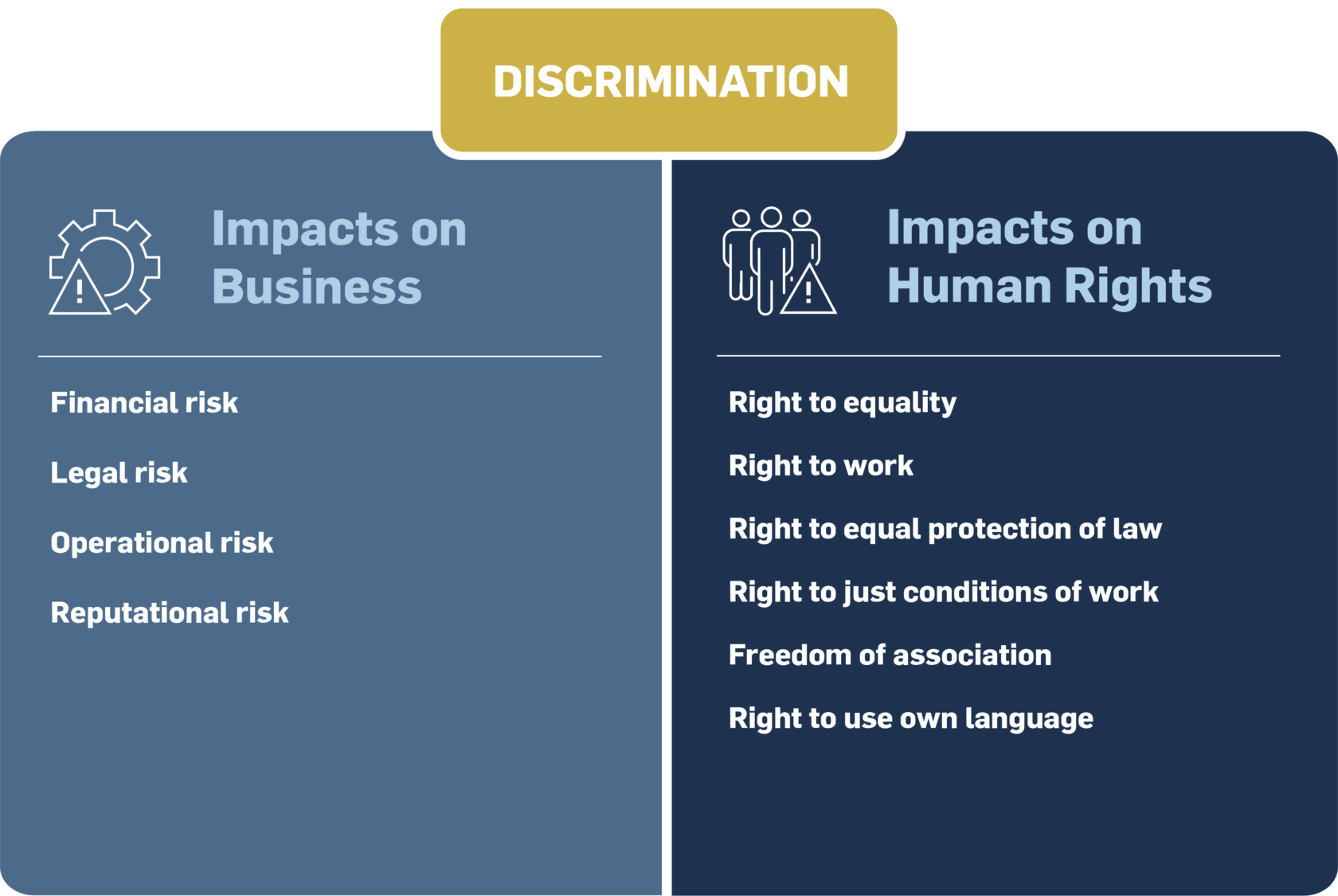
Impacts on Human Rights
Freedom from discrimination is a fundamental human right and is essential for workers to be able to choose their employment freely, develop their potential to the full and reap economic rewards based on merit. Discrimination in employment and occupation has the potential to impact a range of human rights,[1] including but not limited to:
- Right to equality and right to pursue economic, social and cultural development without discrimination (UDHR, Article 2, ICESCR, Article 2): All human rights should be enjoyed by all people “without distinction of any kind” and regardless of their status (including their national, ethnic and cultural origin/affiliation).
- Right to work (UDHR, Article 23, ICESCR, Article 6): Discrimination affects the capacity to enjoy the fundamental right to work. This right encompasses the right to equal pay for equal work, as well as equal access to technical and vocational guidance and training programmes.
- Right to enjoy just and favourable conditions of work (UDHR, Article 23, ICESCR, Article 7): Elements of this right include equal remuneration for work of equal value, safe and healthy living conditions and the provision of rest, leisure and reasonable limits on working hours for all people independent of their personal status.
- Right to freedom of association (UDHR, Article 20, ICCPR, Article 22): In some countries, members of minority groups or migrant workers may be prevented from forming workers’ organizations and participating in social dialogue.
- Right to use own language (ICCPR, Article 27): Minority groups are usually found in a ‘non-dominant’ position in the societies in which they live and often speak languages that are not shared with the majority and/or dominant groups. Therefore, a lack of materials available in languages or dialects spoken by minorities may undermine their ability to engage with State officials and institutions and undermine their collective bargaining options.
Sustainable Development Goals (SDGs)
The following SDG targets relate to non-discrimination in employment and occupation:
- Goal 1 (“End poverty in all its forms everywhere”), Target 1.4: By 2030 ensure that all men and women, particularly the poor and the vulnerable, have equal rights to economic resources, as well as access to basic services, ownership, and control over land and other forms of property, inheritance, natural resources, appropriate new technology, and financial services including microfinance.
- Goal 4 (“Ensure inclusive and equitable quality education and promote lifelong learning opportunities for all”), Target 4.5: By 2030, eliminate gender disparities in education and ensure equal access to all levels of education and vocational training for the vulnerable, including persons with disabilities, indigenous peoples, and children in vulnerable situations.
- Goal 5 (“Achieve gender equality and empower all women and girls”):
- Target 5.2: Eliminate all forms of violence against all women and girls in public and private spheres, including trafficking and sexual and other types of exploitation.
- Target 5.4: Recognize and value unpaid care and domestic work through the provision of public services, infrastructure and social protection policies, and the promotion of shared responsibility within the household and the family as nationally appropriate.
- Target 5.5: Ensure women’s full and effective participation and equal opportunities for leadership at all levels of decision-making in political, economic, and public life.
- Target 5.a: Undertake reforms to give women equal rights to economic resources, as well as access to ownership and control over land and other forms of property, financial services, inheritance, and natural resources in accordance with national laws.
- Goal 8 (“Promote sustained, inclusive and sustainable economic growth, full and productive employment and decent work for all”):
- Target 8.5: By 2030 achieve full and productive employment and decent work for all women and men, including for young people and persons with disabilities, and equal pay for work of equal value.
- Target 8.8: Protect labour rights and promote safe and secure working environments of all workers, including migrant workers, particularly women migrants, and those in precarious employment.
- Goal 10 (“Reduce inequality within and among countries”), Target 10.3: Ensure equal opportunity and reduce inequalities of outcome, including through eliminating discriminatory laws, policies and practices and promoting appropriate legislation, policies and actions in this regard.
Key Resources
The following resources provide further information on how businesses can address discrimination in their operations and supply chains:
- United Nations Global Compact-OHCHR, The Labour Principles of the UN Global Compact — A Guide for Business: The purpose of this guide is to increase the understanding of the four labour principles, including Principle 6 on Non-Discrimination in Employment, as well as to provide an inventory of key resources to help integrate these principles into business operations.
- ILO, Equality at Work: The Continuing Challenge: A global report on diversity in the workplace and examples of how to improve it.
Definition & Legal Instruments
Definition
Discrimination in employment and occupation is defined by the ILO as “any distinction, exclusion or preference made on the basis of race, colour, sex, religion, political opinion, national extraction or social origin, which has the effect of nullifying or impairing equality of opportunity or treatment in employment or occupation”. In other words, this means treating people differently or less favourably because of characteristics that are not related to their competency or the inherent requirements of the job.
Discrimination can stem from both direct and indirect actions by employers:
- Direct discrimination is straightforward; for example, excluding a job applicant due to their ethnic, religious, national, linguistic, disability or cultural background.
- Indirect discrimination involves an apparently neutral requirement or practice that has a disproportionate impact on a particular group, and which is not necessary and appropriate to achieve a legitimate, job-related objective.
Affirmative action (also known as ‘positive action’) may be permissible if its objective is to overcome past discrimination or address persisting inequalities. When operating in a country that has such measures in place, companies may be required to analyze their operations and supply chains to identify conditions that cause or maintain discrimination against relevant disadvantaged groups. They may then be required to take action to actively promote equality or to grant preferential treatment to certain groups, so long as there are no automatic and rigid quotas.
Legal Instruments
The right to be free from discrimination is firmly secured in international human rights instruments, including the UDHR, ICCPR and ICESCR. The right to equality and non-discrimination is also affirmed in relation to specific groups, such as women (CEDAW, article 11.1), migrant workers (CMW, article 7) or persons with disabilities (CRPD, article 27).
The elimination of discrimination in employment and occupation is one of five fundamental principles and rights at work by the ILO which Member States must promote, irrespective of whether or not they have ratified the respective conventions listed below, and it is the focus of Principle 6, one of the Ten Principles of the UN Global Compact.
Relevant ILO conventions include two core ILO Conventions on Discrimination:
- ILO Discrimination (in Employment and Occupation) Convention, No. 111 (1958) requires ratifying countries to enforce national policies to promote respect and equal opportunities in the workplace and identifies race, colour, sex, religion, political opinion, national extraction and social origin as bases of discrimination.
- ILO Equal Remuneration Convention, No. 100 (1951) promotes the principle of equal pay for work of equal value.
Other relevant ILO instruments include:
- Part-time Work Convention, No.175 (1994) and Recommendation, No.182 (1994)
- Maternity Protection Convention, No.183 (2000) and Recommendation, No.191 (2000)
- Workers with Family Responsibilities Convention, No.156 (1981) and Recommendation, No.165 1981
- Vocational Rehabilitation and Employment (Disabled Persons) Convention, No. 159 (1983) and Recommendation, No. 168 (1983)
- Older Workers Recommendation, No. 162 (1980)
- Migration for Employment Convention (Revised), No. 97 (1949)
- Indigenous and Tribal Peoples Convention, No. 169 (1989)
- Violence and Harassment Convention, No. 190 (2019) and Recommendation, No. 206 (2019)
While most States have ratified the first two fundamental ILO conventions on non-discrimination, their implementation in national laws and enforcement of such laws vary greatly. In practice, the provision of legal protection against discrimination in respect of employment and occupation is not consistent across countries.
Non-discrimination is included as one of the Ten Principles of the UN Global Compact: “Principle 6: Businesses should uphold the elimination of discrimination in respect of employment and occupation”. The four labour principles of the UN Global Compact are derived from the ILO Declaration on Fundamental Principles and Rights at Work.
These fundamental principles and rights at work have been affirmed and developed in the form of specific rights and obligations in International Labour Conventions and Recommendations and cover issues related to child labour, discrimination at work, forced labour and freedom of association and the right to collective bargaining.
Member States of the ILO have an obligation to promote non-discrimination, even if they have not ratified the Conventions in question.
Regional and National Legislation
Companies are increasingly subject to non-financial reporting and due diligence obligations in the jurisdictions in which they operate, which often include disclosures on their performance. There are several high-profile examples of national legislation that specifically mandate human rights-related reporting and other positive legal duties, including the French Corporate Duty of Vigilance Law 2017, the German Act on Corporate Due Diligence Obligations in Supply Chains and the Norwegian Transparency Act 2022.
Also, in 2021 the Netherlands submitted a Bill for Responsible and Sustainable International Business Conduct, and the European Commission announced its Corporate Sustainability Due Diligence Directive (CSDDD). This Directive is likely to come into force between 2025 and 2027 and will make human rights and environmental due diligence mandatory for larger companies.
These mandatory due diligence and disclosure laws require companies to publicly communicate their efforts to address actual and potential human rights impacts, including violations in relation to discrimination in the workplace. Failure to comply with these obligations leads to real legal risk for companies.
Contextual Risk Factors
The elimination of discrimination in operations and supply chains requires an understanding of its underlying causes and the consideration of a wide range of contextual issues. Key risk factors include:
- Widespread societal/cultural acceptance of discrimination: Discrimination may be used to maintain the advantages (whether economic, political, social, educational, racial, etc.) of one group over other(s). Power disparities can, over time, be solidified due to unequal access to education and public life. For example, in India, it is a punishable offence to practice ‘untouchability’ (i.e. a severe form of discrimination against Dalits and other members of scheduled castes). Despite policy development and legislation, caste-based discrimination remains deeply entrenched.
- Laws and regulation: In some countries, certain groups are actively and directly discriminated against through laws and regulations. Marriage inequality is one such example, where marriage between same-sex couples remains banned in many countries. Although there has been greater global recognition of LGBTIQ+ rights over the last few decades, same-sex marriage is only legal in 29 countries.
- Poorly enforced domestic labour laws due to a lack of government resources and/or capacity. This can lead to discrimination issues occurring in the workplace without any remediation as the legal system to address discrimination may be weak. While anti-gender discrimination laws exist in many countries, women continue to be discriminated against in the workplace, for instance by facing pay inequality or sexual harassment.
- Religious factors and preferences: In some countries or regions religious differences can be a cause of discrimination. Religious discrimination occurs when an individual is treated differently because of their religion or belief, or lack of religion or belief. This can manifest in discrimination in the workplace. For example, Muslims face intolerance and discrimination in Europe, where they may suffer social exclusion, including barriers to accessing education and employment.
- Migration flows: Migration has increased hugely in the last twenty years, resulting in many workplaces having employees from a range of countries and nationalities. This can exacerbate discrimination on the grounds of race, nationality, religion, language or appearance as multicultural workforces are increasingly common, and stigmas or clashes may occur. Migrants often face significant discrimination in obtaining jobs and attaining pay equality in Western Europe and other parts of the industrialized world. A 2020 ILO report finds that migrants earn nearly 13% less on average than national workers in high-income countries.
- Globalization of operations: Many companies operate in regions where legal frameworks and political attitudes may not be conducive to the elimination of discrimination. When companies operate in countries where discrimination is rampant, workers in their operations and supply chains are more likely to face workplace conditions where gender, religious, racial, linguistic or other types of discrimination may occur.
Racial Discrimination in Employment
Discrimination is found in all industries and there are no particular industries or sectors where discrimination is more prevalent. This focus box highlights how racial discrimination, in particular, can occur in the workplace and applies to all sectors.
- Recruitment: Racism can begin during the hiring or recruitment process. Firstly, companies that rely on networks and informal connections to find new candidates may unintentionally exclude people of different races or ethnicities, as social networks are likely to be mostly with those of the same race or ethnicity. Secondly, while companies may not actively discriminate against candidates based on race, racial profiling or unconscious biases can alter recruiters’ opinions of candidates.
- Workplace: Racism can occur in the workplace, particularly where there are weak, ineffective or even non-existent policies on racism. Racism may go unreported by victims when they feel their complaint will not help to create change, or that it could in fact harm them further. Racial microaggressions, for example, can be subtle or unintentional, but are nevertheless a form of discrimination against members of a marginalized group. Employers should take steps to prevent microaggressions and ensure that complaints on microaggressions do not go unresolved. Racism can also cause employees to lose out on opportunities, such as training or promotion. Finally, racism can also be a factor in the termination of employment.
- Supply chains: For businesses with global supply chains, racism may look different in different countries. For example, companies operating in the Indian subcontinent are likely to face attitudes that continue to be deeply entrenched in caste-based discrimination. Workers from caste-affected communities are particularly vulnerable to working under hazardous conditions for minimal pay. Dalits are also more likely to face long working hours, sexual harassment, lower wages and other forms of abusive working conditions and negative treatment.
Due Diligence Considerations
This section outlines due diligence steps that companies can take to address discrimination in their operations and supply chains. The described due diligence steps are aligned with the UN Guiding Principles on Business and Human Rights (UNGPs). Further information on UNGPs is provided in the ‘Key Human Rights Due Diligence Frameworks’ section below or in the Introduction.
While the below steps provide guidance on non-discrimination in particular, it is generally more resource-efficient for companies to ‘streamline’ their human rights due diligence processes by also identifying and addressing other relevant human rights issues (e.g. child labour, forced labour, freedom of association) at the same time.
Key Human Rights Due Diligence Frameworks
Several human rights frameworks describe the due diligence steps that businesses should ideally implement to address human rights issues, including non-discrimination. The primary framework is the UN Guiding Principles on Business and Human Rights (UNGPs). Launched in 2011, the UNGPs offer guidance on how to implement the United Nations “Protect, Respect and Remedy” Framework, which establishes the respective responsibilities of Governments and businesses — and where they intersect.
The UNGPs set out how companies, in meeting their responsibility to respect human rights, should put in place due diligence and other related policies and process, which include:
- A publicly available policy setting out the company’s commitment to respect human rights;
- Assessment of any actual or potential adverse human rights impacts with which the company may be involved across its entire value chain;
- Integration of the findings from their impact assessments into relevant internal functions/processes — and the taking of effective action to manage the same;
- Tracking of the effectiveness of the company’s management actions;
- Reporting on how the company is addressing its actual or potential adverse impacts; and
- Remediation of adverse impacts that the company has caused or contributed to.
The steps outlined below follow the UNGPs framework and can be considered a process which a business looking to start implementing human rights due diligence processes can follow.
Additionally, the OECD Guidelines on Multinational Enterprises define the elements of responsible business conduct, including human and labour rights.
Another important reference document is the ILO Tripartite Declaration of Principles concerning Multinational Enterprises and Social Policy (MNE Declaration), which contains the most detailed guidance on due diligence as it pertains to labour rights. These instruments, articulating principles of responsible business conduct, draw on international standards enjoying widespread consensus.
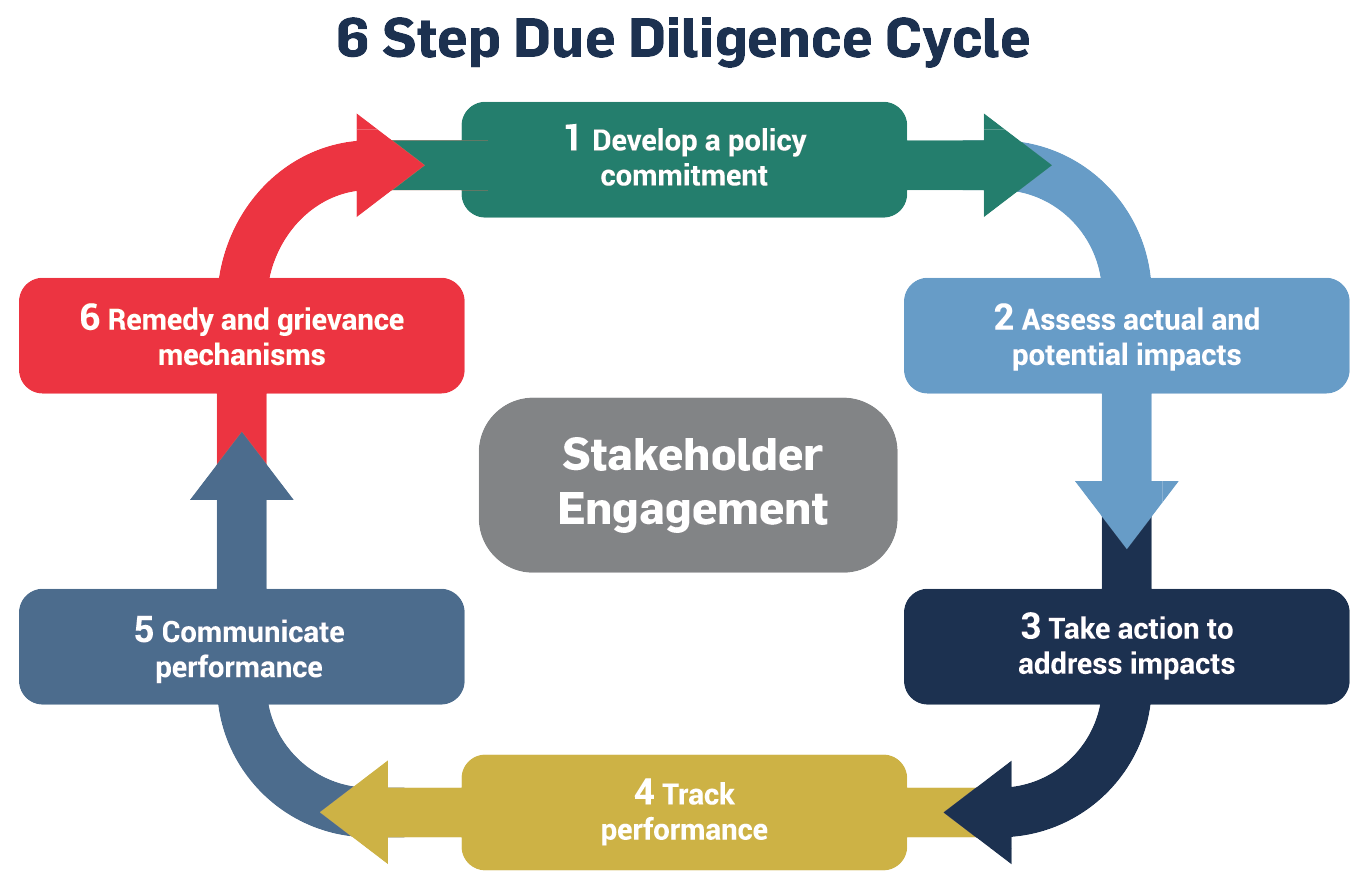
Companies can seek specific guidance on this and other issues relating to international labour standards from the ILO Helpdesk for Business. The ILO Helpdesk assists company managers and workers that want to align their policies and practices with principles of international labour standards and build good industrial relations. It has a specific section on non-discrimination and equality. The ILO Helpdesk has developed a factsheet specifically on non-discrimination, which provides practical guidance for managers.
Additionally, the SME Compass offers guidance on the overall human rights due diligence process by taking businesses through five key due diligence phases. The SME Compass has been developed in particular to address the needs of SMEs but is freely available and can be used by other companies as well. The tool, available in English and German, is a joint project by the German Government’s Helpdesk on Business & Human Rights and the Deutsche Gesellschaft für Internationale Zusammenarbeit (GIZ) GmbH.
1. Develop a Policy Commitment on Non-Discrimination
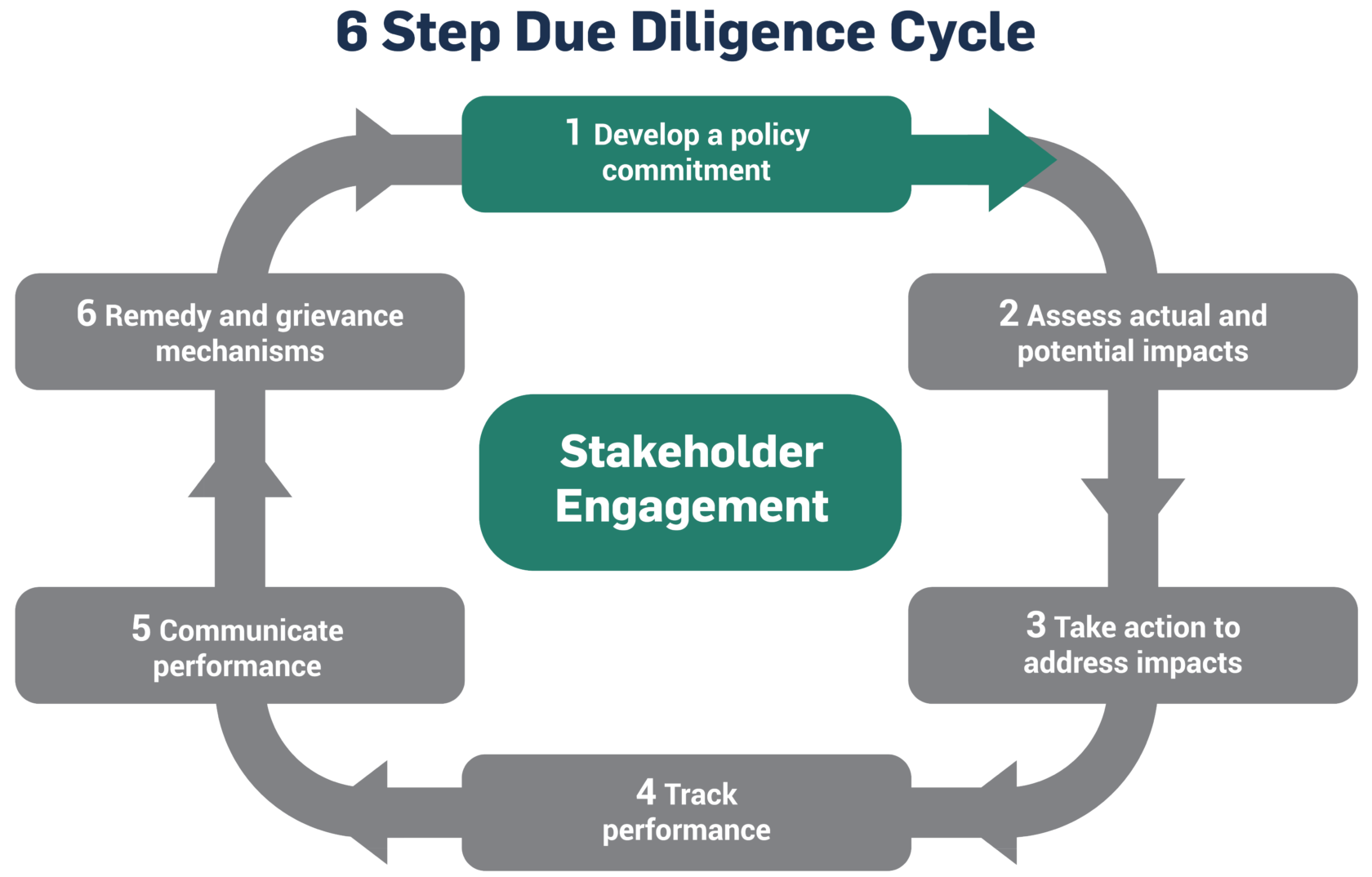
UNGP Requirements
As per the UNGPs, a human rights policy should be:
- “Approved at the most senior level” of the company;
- “Informed by relevant internal and/or external expertise”;
- Specific about company’s “human rights expectations of personnel, business partners and other parties directly linked to its operations, products or services”;
- “Publicly available and communicated internally and externally to all personnel, business partners and other relevant parties”; and
- “Reflected in operational policies and procedures necessary to embed it throughout the business”.
The starting point for any business to tackle discrimination is to develop a company commitment to non-discrimination. First, any company introducing policies to promote equality and avoid discrimination needs to be aware of the diversities of language, culture and family circumstances that may exist in the workforce. For example, both business services firm Ernst & Young and investment bank Citigroup have stand-alone anti-racism policies. The integration of non-discrimination aspects into a human rights policy is another option that companies such as Microsoft have adopted. Where companies do not have a human rights policy, non-discrimination is often addressed in other documentation, such as a business code of conduct or ethics and/or a supplier code of conduct.
Businesses may also consider aligning their non-discrimination policies with relevant industry-wide and cross-sector policy commitments, for example:
- Responsible Business Alliance (RBA) Code of Conduct
- Ethical Trading Initiative (ETI) Base Code
- amfori BSCI Code of Conduct
- Fair Labor Association (FLA) Code of Conduct
In addition to these overarching industry-wide initiatives, businesses could consider joining non-discrimination-specific global initiatives, such as the Partnering for Racial Justice in Business initiative launched by the World Economic Forum in January 2021. To join the Initiative, three steps are required from businesses:
- Racial and ethnic equity must be placed on the board’s agenda;
- Companies must make at least one commitment towards racial and ethnic justice in their organizations; and
- Companies must put a long-term strategy in place towards becoming an anti-racist organization.
Among the founding members of the Partnering for Racial Justice in Business initiative are global companies such as AstraZeneca, Deutsche Bank, H&M, HP, Johnson & Johnson, Microsoft, Nestlé, PepsiCo, Coca-Cola and Unilever.
Businesses may want to check the ILO Helpdesk for Business, which provides answers to the most common questions that businesses may encounter while developing their non-discrimination policies — or integrating non-discrimination commitments into other policy documents. Examples include:
- What are the prohibited bases of discrimination in employment?
- Is there any distinction that is not considered discriminatory?
- A company wants to recruit a worker for a job that requires physical strength. This job cannot be adapted, so as a consequence, the company does not want to receive applications from older people, persons of smaller builds, women or disabled persons. To what extent can this recruitment practice be considered a breach of ILO conventions related to discrimination? How can a company respect ILO principles related to discrimination without putting at risk the health and safety of its workers?
Helpful Resources
- ILO, Promoting Equity, Chapter 2: This guide provides information on how to create an ethnic diversity policy for businesses, including a sample policy and a sample plan for implementing proactive measures.
- United Nations Global Compact, A Guide for Business: How to Develop a Human Rights Policy: This guidance provides recommendations on how to develop a human rights policy and includes extracts from companies’ policies referencing non-discrimination.
- United Nations Global Compact, Guide for Business on the Rights of Persons with Disabilities: A guide for businesses to help improve their understanding of how to respect and support the rights of people with disabilities and close the opportunity gap while at the same time improving their company’s competitiveness and sustainability.
- Ethical Trading Initiative, Base Code Guidance: Gender Equality (B) — Gender and Human Rights Due Diligence: A detailed guide on human rights due diligence on gender equality, including a section on building company leadership and commitment to gender equality and women’s rights.
- Business in the Community, Anti-racism and Allyship in the Workplace Toolkit: A collection of tools and resources to support businesses in becoming anti-racist.
2. Assess Actual and Potential Discrimination Impacts
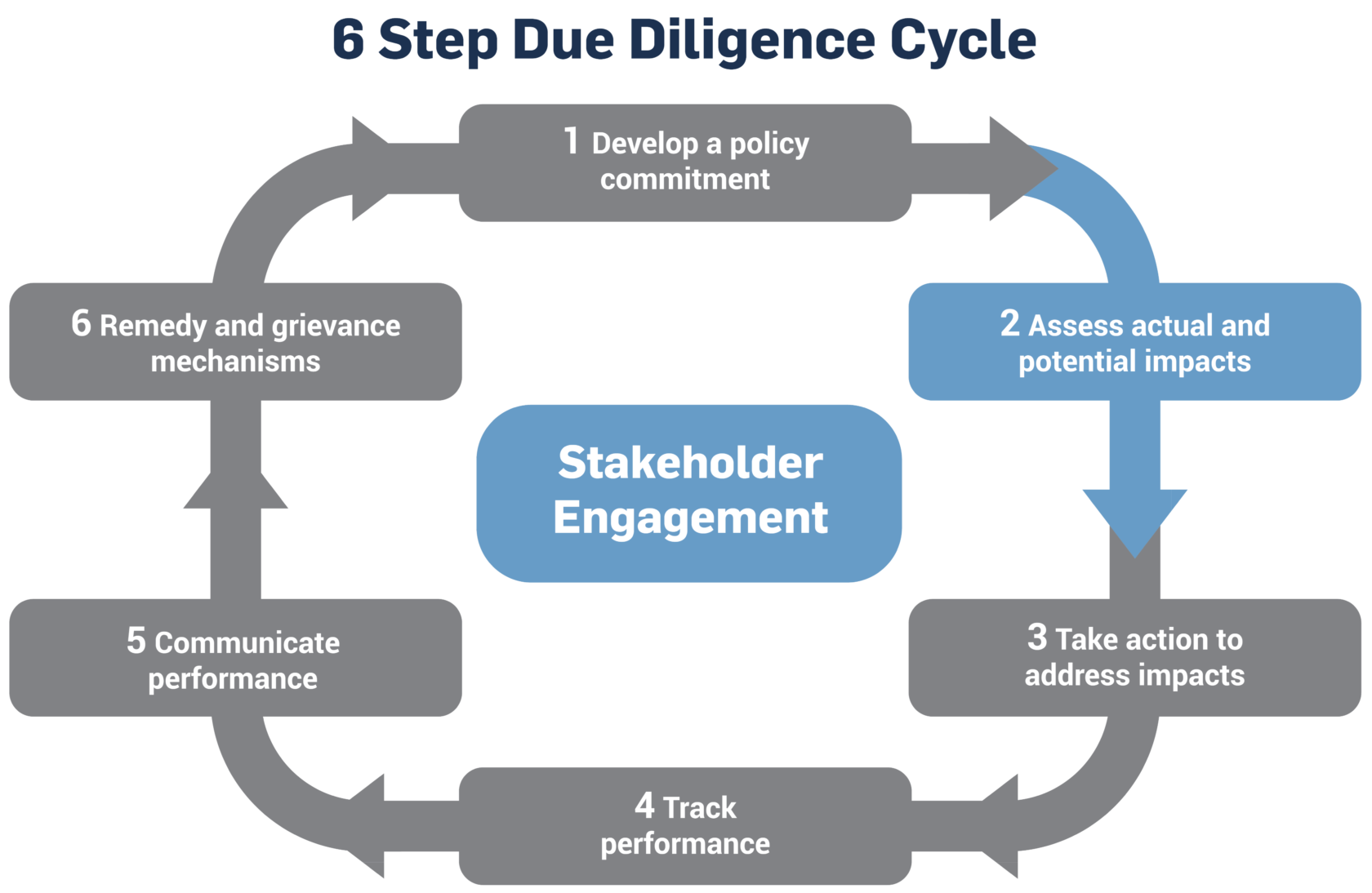
UNGP Requirements
The UNGPs note that impact assessments:
- Will vary in complexity depending on “the size of the business enterprise, the risk of severe human rights impacts, and the nature and context of its operations”;
- Should cover impacts that the company may “cause or contribute to through its own activities, or which may be directly linked to its operations, products or services by its business relationships”;
- Should involve “meaningful consultation with potentially affected groups and other relevant stakeholders” in addition to other sources of information such as audits; and
- Should be ongoing.
Impact assessments should look at both actual and potential impacts, i.e. impacts that have already manifested or could manifest. This compares to risk assessment that would only look at potential impacts and may not satisfy all of the above criteria.
Businesses should seek to develop an understanding of the different types of discrimination and how it can affect people in their own operations and their value chains. For example, women constitute a growing proportion of the world’s workforce, but on average continue to earn less than their male counterparts or are not provided with the same opportunities. Another example is employees with disabilities who may have particular needs that should be met, where reasonable, in order to ensure that they have the same opportunities (e.g. for training and advancement) as their peers.
Impact assessments focusing on discrimination could include the following:
- The prevalence of discrimination (in access to employment, education, land, capital, economic opportunities etc.) based on ethnicity, religion and other grounds;
- The potential for such discrimination to impact on the company and its workforce — and vice-versa.
Assessing the prevalence of intersectional discrimination will also help companies gain a better picture of the different layers of discrimination people (potentially) affected by their operations and value chains may face. Intersectional discrimination occurs when an individual is discriminated against on two or multiple grounds that interact simultaneously and in an inseparable manner. For example, women may face discrimination not only based on their gender, but also because of their age, disability, social and economic status, ethnicity and race.
Any such assessment should be commensurate with operational requirements and may range from a desk-based assessment to on-site and corporate-level exercises. Depending on the sector and expanse of operations, companies might consider integrating customers, business partners, suppliers and contractors into the assessment — to ensure the full range of potential and actual risks and impacts are addressed.
When conducting an assessment, companies might focus on three key areas:
1. External context
- Does the country of operation have a history of divisiveness (e.g. on religious, ethnic or national grounds) and does it demonstrate evidence of discrimination within broader society? Does the company have adequate anti-discrimination policies and processes to ensure workers in their global supply chains are not discriminated against in the workplace?
- What are the relevant laws pertaining to equal opportunity and non-discrimination? Do these provide adequate protection to marginalized groups to ensure equal opportunity — or are additional measures required?
- Are there local affirmative action requirements for particular groups of employees that may be applicable to your business? If not, would historical circumstances justify unilateral action on the part of the company (in line with relevant legal controls)?
- What are the views of civil society groups in the country or region of operation regarding discrimination faced by marginalized groups in the workplace? Does the company consider such stakeholder concerns and is there a need to facilitate stakeholder partnerships to tackle issues pertaining to discrimination?
2. Internal context
- What is the current makeup of your workforce (e.g. its ethnic, religious, cultural, national or age composition)? And to what extent do current company policies and procedures address discrimination against various groups of employees in all aspects of employment and occupation?
3. Relationships (State/non-State business partners, civil society, value chain actors)
- What is the current makeup of your suppliers’ workforces (e.g. their ethnic, religious, cultural or national compositions)? And what is the current makeup of your customers?
- To what extent do business partners in your value chain (including suppliers and contractors) ensure that people have equal opportunities and treatment (i.e. workers are not discriminated against in their recruitment, hiring and employment practices, and specific groups in the local communities are not harassed and/or discriminated against by security service providers)?
Helpful Resources
- Ethical Trading Initiative, Base Code Guidance: Gender Equality (B) — Gender and Human Rights Due Diligence: A detailed guide on human rights due diligence on gender equality, including ‘Assessment and Analysis’ section that provides guidance on a graduated approach to gender assessments.
- Race Forward, Racial Equity Impact Assessment: This toolkit provides tips and information on conducting a racial equity impact assessment, which can be used to inform various business decisions.
- International Dalit Solidarity Network, Dalit Discrimination Check: This guidance provides guidance on conducting Dalit discrimination checks, including impact assessments, and can be adapted to focus on other discrimination criteria, such as other ethnic minorities or races.
- CSR Risk Check: A tool allowing companies to check which international CSR risks (including related to discrimination) businesses are exposed to and what can be done to manage them. The tool provides tailor-made information on the local human rights situation as well as environmental, social and governance issues. It allows users to filter by product/raw material and country of origin. The tool was developed by MVO Netherland; the German version is funded and implemented by the German Government’s Helpdesk on Business & Human Rights and UPJ.
- SME Compass: Provides advice on how to assess actual and potential human rights risks and how to assess and prioritize risks.
- SME Compass, Risk Analysis Tool: This tool helps companies to locate, asses and prioritize significant human rights and environmental risks long their value chains.
- SME Compass, Supplier review: This practical guide helps companies to find an approach to manage and review their suppliers with respect to human rights impacts.
3. Integrate and Take Action to Address Discrimination Impacts
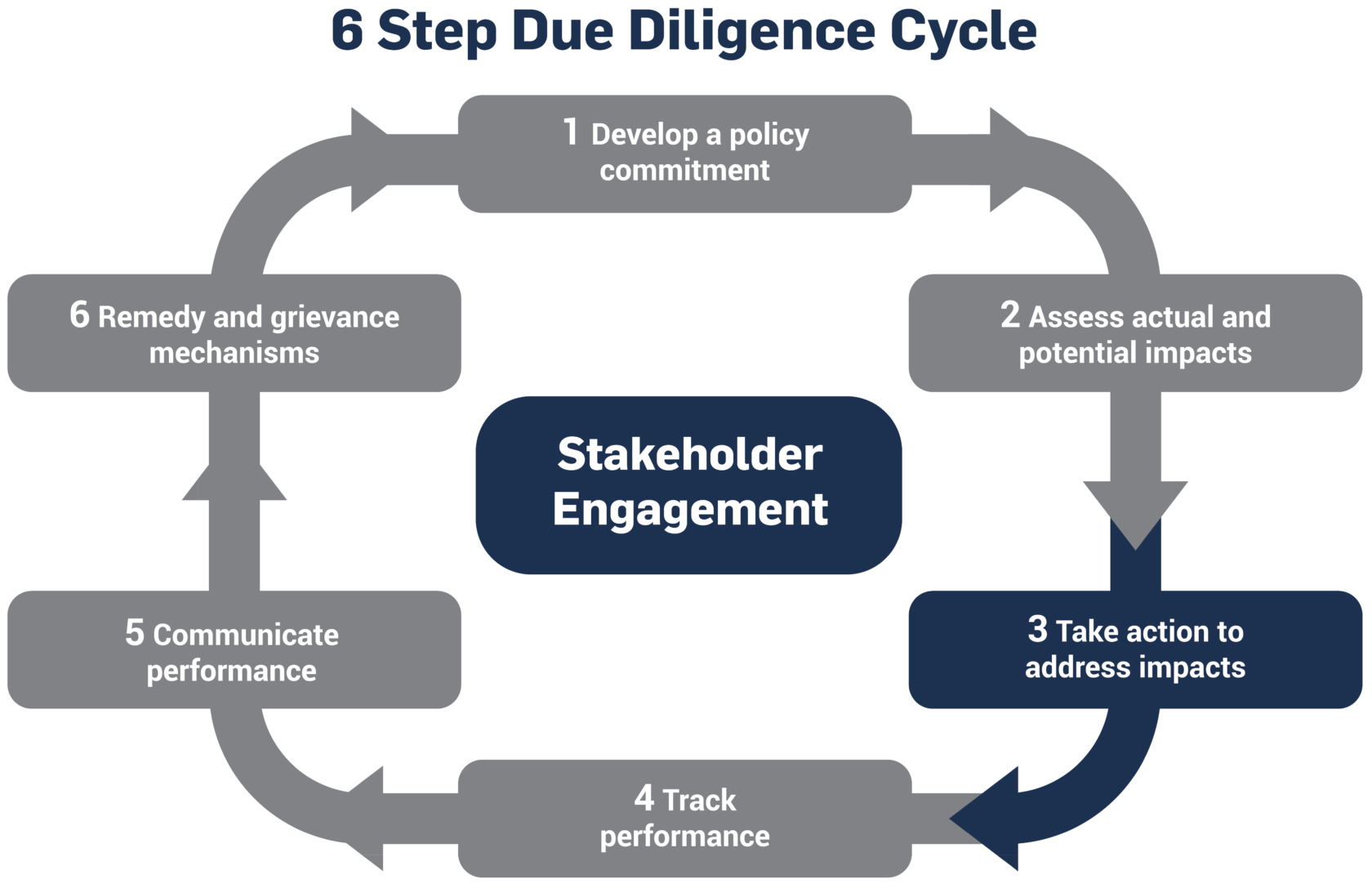
UNGP Requirements
As per the UNGPs, effective integration requires that:
- “Responsibility for addressing [human rights] impacts is assigned to the appropriate level and function within the business enterprise” (e.g. senior leadership, executive and board level); and
- “Internal decision-making, budget allocations and oversight processes enable effective responses to such impacts”.
Examples of company actions to address discrimination include the following:
- Removing existing obstacles to non-discrimination practices: This may involve checking whether existing policies and processes (covering employees, contractors and other third parties) are intentionally or unintentionally discriminatory and implementing corrective measures if required.
- Affinity groups: Affinity groups are voluntary groups consisting of employees sharing a common identity and having the objective of promoting workplace tolerance. Supporting the establishment of affinity groups could be an effective strategy to complement other structural measures to tackle discrimination. The groups are commonly organized along ethnic, religious, cultural and linguistic lines, providing a useful support network to employees of a particular identity. In addition, they are intended to raise awareness and understanding of particular groups and persons belonging to ethnic, cultural and other identities within the general workforce. Examples of companies that have facilitated the creation of affinity groups include HSBCand PwC.
- Diversity training: Examples of companies that conduct diversity training for their employees and suppliers include Unileverand Mitsubishi Motors. Conducting unconscious bias training can also help staff understand possible implicit biases that may impact recruitment and/or promotions and provide tools to adjust possible patterns of thinking that lead to discriminatory behaviours.
- Capability building for disadvantaged groups: Companiesmay wish to engage in employee mentoring, skills training or sponsoring of programmes to combat discrimination and/or to bolster the career prospects of disadvantaged groups. Such capability-building activities may include employee mentoring (for example through formal programmes involving senior managers and other staff); targeted recruitment to increase the representation of disadvantaged groups; and scholarships and language courses. For example, technology company Lenovo offers support and community around disability, early-career professionals and religious affiliation.
- Engaging with workers’ representatives: Tackling discrimination in the workplace often requires a cultural transformation across all levels of the enterprise. Buy-in from the workers is essential; workers’ representatives can — and should — play a leading role in this process.
- Promoting diversity in procurement: Companies may promote or require compliance with a specific code of conduct for key business partners (e.g. suppliers and sub-contractors), which contains non-discrimination requirements. Companies can (subject to local laws) also apply preferential procurement to increase the proportion they spend with minority suppliers — or suppliers who benefit minority individuals. For example, Walmart procured goods through 2,800 suppliers through its Supplier Inclusion Programme in 2019. The promotion of diversity within procurement can be subject to official requirements. For example, the Broad-Based Black Economic Empowerment (BBBEE) policy in South Africa includes criteria requiring companies to procure from recognized BBBEE suppliers as part of their overall qualification.
Helpful resources
- ILO, Promoting Equity, Chapter 3: This guide provides information on how to implement an ethnic diversity policy.
- Ethical Trading Initiative, Base Code Guidance: Disability Inclusion in the Global Supply Chain: A detailed guide on actions that businesses can take to promote the employment of people with disabilities in global supply chains.
- Ethical Trading Initiative, Base Code Guidance: Gender Equality (B) — Gender and Human Rights Due Diligence: A detailed guide on human rights due diligence on gender equality, including a section on concrete steps for addressing gender inequality in the supply chain.
- Diversity Best Practices: A website featuring interviews, resources and company activities and best practices on diversity, including anti-racism.
- SME Compass: Provides adviceon how to take action on human rights by embedding them in your company, creating and implementing an action plan, and conducting a supplier review and capacity building.
- SME Compass, Identifying stakeholders and cooperation partners: This practical guide is intended to help companies identify and classify relevant stakeholders and cooperation partners
- SME Compass, Standards Compass: This online tool offers guidance on what to pay attention to when selecting sustainability standards or when participating in multi-stakeholder initiatives. It allows comparing standards and initiatives with respect to their contribution to human rights due diligence and their potential limitations.
4. Track Performance on Non-Discrimination
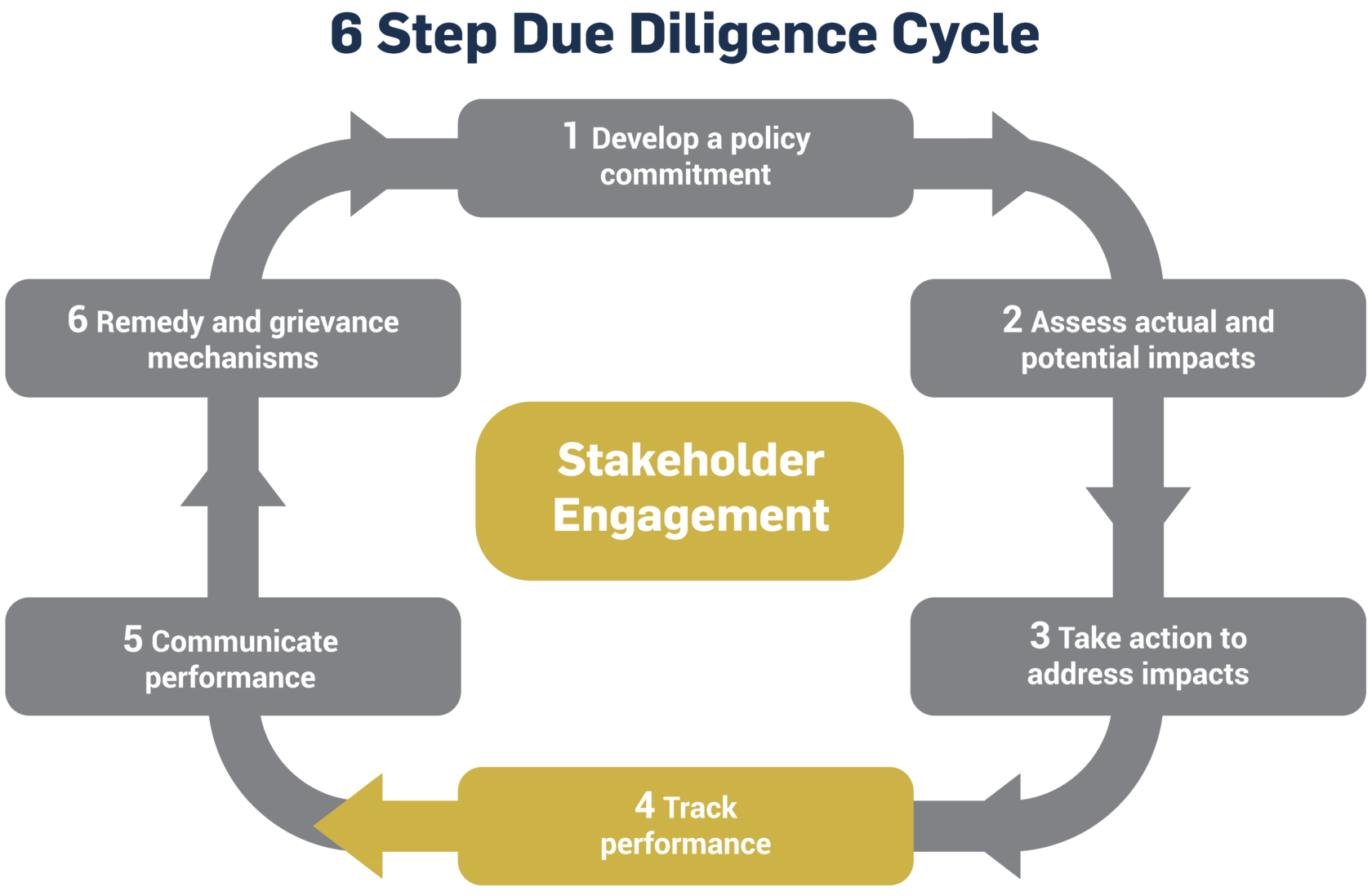
UNGP Requirements
As per the UNGPs, tracking should:
- “Be based on appropriate qualitative and quantitative indicators”; and
- “Draw on feedback from both internal and external sources, including affected stakeholders” (e.g. through grievance mechanisms).
There are several ways to track performance on discrimination. However, it is important to note that discrimination may go unnoticed, especially where the victim feels vulnerable or afraid to report the issue. As such, making sure any tracking mechanisms are anonymous and as safe as possible is important. Steps on how companies can ensure workers have access to remedy and grievance mechanisms are detailed in the Remedy and Grievance Mechanisms section below.
The most common way of tracking performance on discrimination is through employee engagement and surveys, particularly anonymous ones. Gathering the experiences of employees will help companies determine the impact of their policies and processes and identify areas for improvement or remediation.
Supplier audits can help identify instances of discrimination in supply chains and allow a company to monitor performance. However, as with own operations, engagement with workers is likely to be the best way to understand discrimination within suppliers’ operations as visiting auditors are unlikely to view any discrimination, in particular indirect discrimination, which requires discussion with workers to understand disparate impacts of prima facie neutral criteria. Where workers feel unable to speak about their experiences, using anonymous feedback processes or ‘worker voice’ technologies can be helpful.
Responsibility for tracking performance on discrimination should be clearly allocated to relevant roles within the company and performance KPIs should be clearly defined. For example, HP has defined the following goals in relation to racial equality:
- Double the number of Black and African American executives by 2025;
- Double Black and African American promotion rates and technical representation by 2025; and
- Achieve 90% (up from 84%) in inclusion index score for Black and African American employees in 2021.
Another example of a company that has set KPIs with respect to diversity and inclusion is Japanese food company Calbee, which has a 30% target of female managers by FY2023/24, an increase of its current rate of 20.4% as of April 2020.
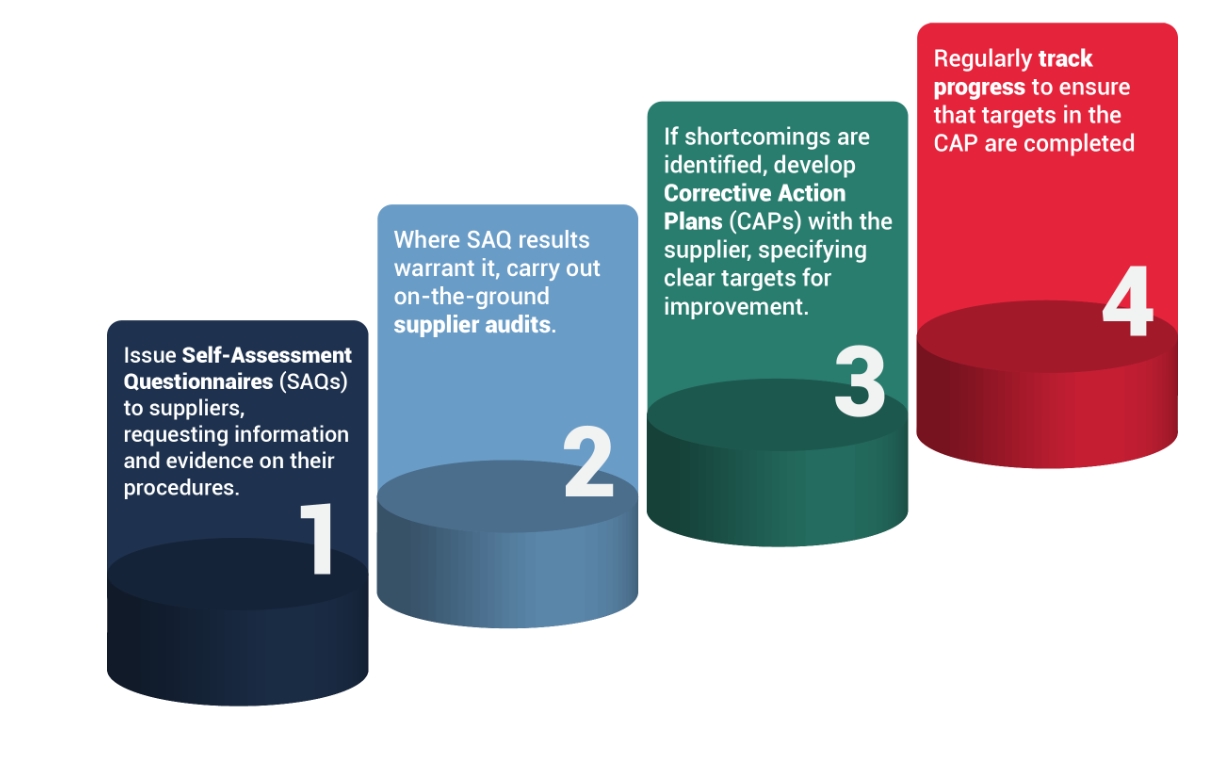
Helpful Resources
- ILO, Promoting Equity, Chapters 1 and 4: This guide provides information on how to conduct an ethnic diversity audit in business, and how to monitor and review an ethnic diversity policy.
- Ethical Trading Initiative, Base Code Guidance: Gender Equality (B) — Gender and Human Rights Due Diligence: A detailed guide on human rights due diligence on gender equality, including a section on tracking performance.
- SME Compass: Key performance indicators for due diligence: Companies can use this overview of selected quantitative key performance indicators to measure implementation, manage it internally and/or report it externally.
- SME Compass: Measuring and reporting on progress: This resource provides an overview of how to measure and report on the progress of the actions taken to address human rights impacts.
5. Communicate Performance on Non-Discrimination
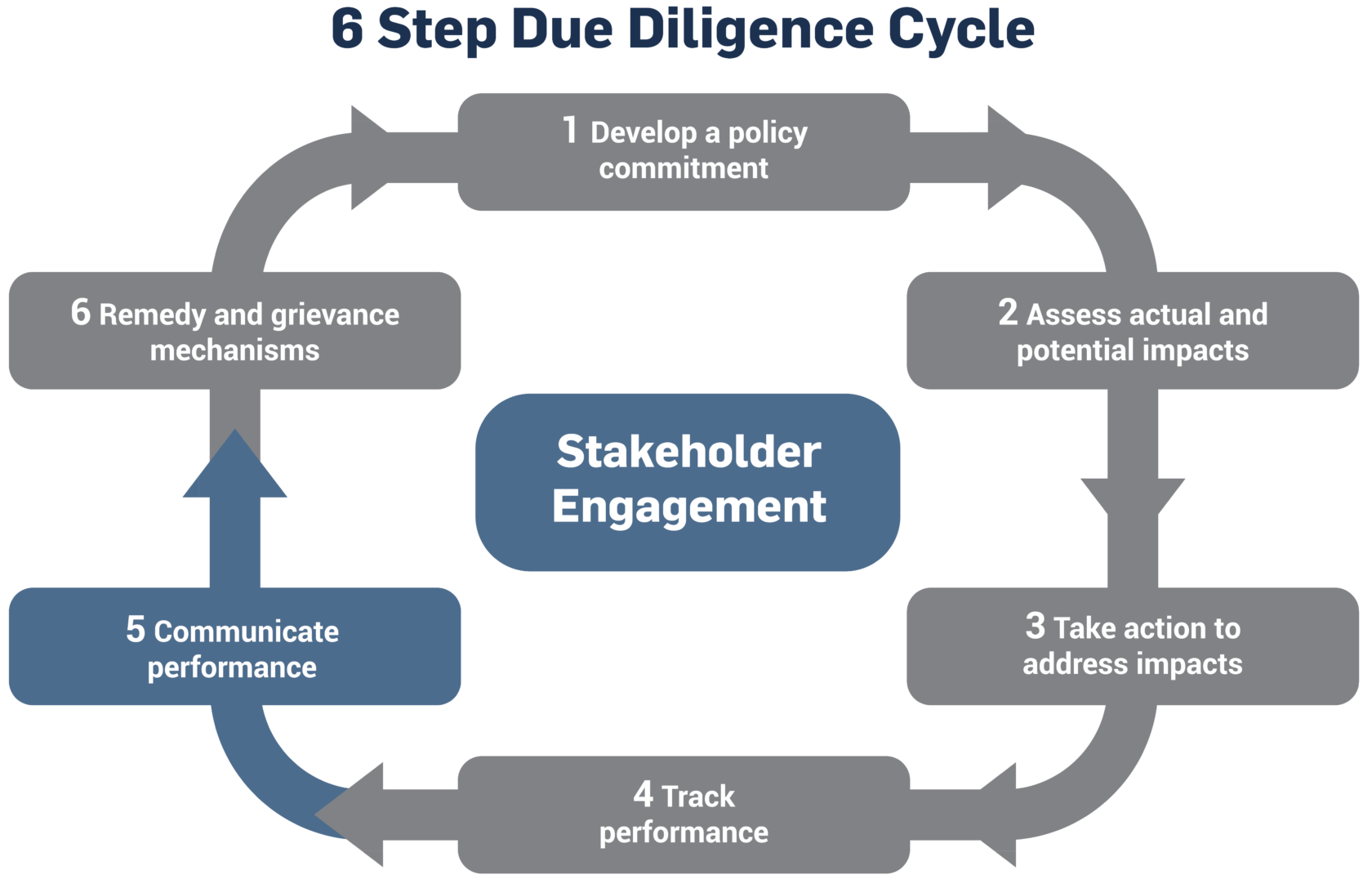
UNGP Requirements
As per the UNGPs, regular communications of performance should:
- “Be of a form and frequency that reflect an enterprise’s human rights impacts and that are accessible to its intended audiences”;
- “Provide information that is sufficient to evaluate the adequacy of an enterprise’s response to the particular human rights impact involved”; and
- “Not pose risks to affected stakeholders, personnel or to legitimate requirements of commercial confidentiality”.
Companies are expected to communicate their performance on non-discrimination in a formal public report. This can take the form of a standalone report such as Barclays’ 2020 Diversity and Inclusion Report or GM’s Diversity and Inclusion Report; alternatively, communication can be made via companies’ broader sustainability or human rights reporting or in their annual Communication on Progress (CoP) in implementing the Ten Principles of the UN Global Compact. Examples of companies covering non-discrimination aspects in their annual sustainability reports include Pertamina and Samsung. Other forms of communication may include in-person meetings, online dialogues and consultation with affected stakeholders.
Helpful Resources
- Global Reporting Initiative, GRI 405: Diversity and Equal Opportunity: The 2016 standard lists the disclosures and activities needed for a business to achieve the standard on an annual basis.
- Global Compact Network UK, Black Lives Matter & Business: This report gives information on how companies can report on ethnicity and race in the workplace, as well as other tips.
- Women’s Empowerment Principles, WEPs Guidance Note: How to Report Progress: This step-by-step guide is designed to help WEPs Signatories report on progress against eight Essential Indicators of the WEPs Transparency and Accountability Framework.
- IFC, Embedding Gender in Sustainability Reporting: A Practitioner’s Guide: This resource offers practical steps on how to embed gender in sustainability reporting.
- UNGP Reporting Framework: A short series of smart questions (‘Reporting Framework’), implementation guidance for reporting companies, and assurance guidance for internal auditors and external assurance providers.
- United Nations Global Compact, Communication on Progress (CoP): The CoP ensures further strengthening of corporate transparency and accountability, allowing companies to better track progress, inspire leadership, foster goal-setting and provide learning opportunities across the Ten Principles and SDGs.
- The Sustainability Code: A framework for reporting on non-financial performance that includes 20 criteria, including on human rights and employee rights.
6. Remedy and Grievance Mechanisms
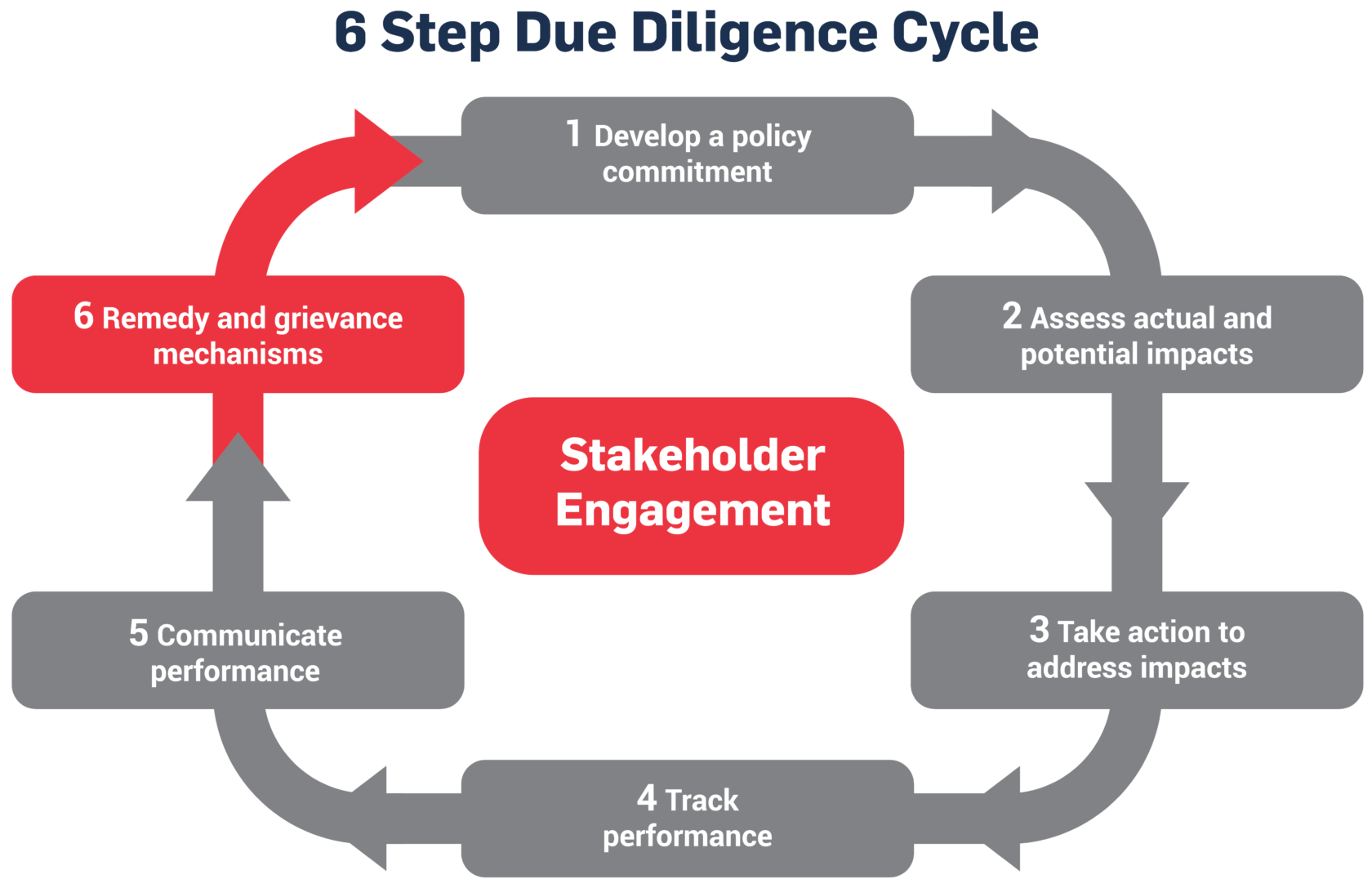
UNGP Requirements
s per the UNGPs, remedy and grievance mechanisms should include the following considerations:
- “Where business enterprises identify that they have caused or contributed to adverse impacts, they should provide for or cooperate in their remediation through legitimate processes”; and
- “Operational-level grievance mechanisms for those potentially impacted by the business enterprise’s activities can be one effective means of enabling remediation when they meet certain core criteria”.
To ensure their effectiveness, grievance mechanisms should be:
- Legitimate: “enabling trust from the stakeholder groups for whose use they are intended, and being accountable for the fair conduct of grievance processes”
- Accessible: “being known to all stakeholder groups for whose use they are intended, and providing adequate assistance for those who may face particular barriers to access”
- Predictable: “providing a clear and known procedure with an indicative time frame for each stage, and clarity on the types of process and outcome available and means of monitoring implementation”
- Equitable: “seeking to ensure that aggrieved parties have reasonable access to sources of information, advice and expertise necessary to engage in a grievance process on fair, informed and respectful terms”
- Transparent: “keeping parties to a grievance informed about its progress, and providing sufficient information about the mechanism’s performance to build confidence in its effectiveness and meet any public interest at stake”
- Rights-compatible: “ensuring that outcomes and remedies accord with internationally recognized human rights”
- A source of continuous learning: “drawing on relevant measures to identify lessons for improving the mechanism and preventing future grievances and harms”
- Based on engagement and dialogue: “consulting the stakeholder groups for whose use they are intended on their design and performance, and focusing on dialogue as the means to address and resolve grievances”
Grievance mechanisms can play an important role in helping to identify and remediate discrimination issues in operations and supply chains. It is however important to be conscious of the fact that formal structures and informal cultural issues can prevent employees from raising concerns and grievances. Grievance mechanisms should be:
- Created with input from the affected groups they are intended to help; and
- Available in multiple formats and languages to accommodate workers’ needs.
It is important that businesses provide grievance mechanisms that prioritize the safety and well-being of the complainant, and that there are anonymous mechanisms available for those who are fearful of repercussions.
Remediating the issues of discrimination can be difficult and should be handled sensitively, as the harm caused to the victim could be significant. If legal proceedings have been taken against the business regarding discrimination, the business should seek legal advice and cooperate in good faith with such proceedings.
It is advisable that businesses have a remediation plan included in their human resources policies and procedures, which can guide responsible employees in remediating the situation in an effective and sufficient way. Examples of remediation actions may include the following:
- Disciplinary measures against the actor(s) responsible for, and management tolerant of, the discriminatory behaviour;
- Return of lost earnings or property lost through discrimination to the victim;
- Altering processes, policies and procedures to ensure that the situation does not arise again; and
- Depending on the type of discrimination, there may also need to be physical changes to a business, such as ensuring accessibility in the workplace for employees with disabilities or offering separate working spaces for men and women.
Helpful Resources
- Ethical Trading Initiative, Access to Remedy: Practical Guidance for Companies: This guidance explains key components of the mechanisms that allow workers to submit complaints and enable businesses to provide remedy.
- Global Compact Network Germany, Worth Listening: Understanding and Implementing Human Rights Grievance Management: A business guide intended to assist companies in designing effective human rights grievance mechanisms, including practical advice and case studies. Also available in German.
- SME Compass: Provides advice on how to establish grievance mechanisms and manage complaints.
- SME Compass, Managing grievances effectively: Companies can use this guide to design their grievance mechanisms more effectively – along the eight UNGP effectiveness criteria – and it includes practical examples from companies.
Case Studies
This section includes examples of company actions to address discriminatory practices in their operations and supply chains.
Further Guidance
This section includes examples of further guidance on non-discrimination. Please also refer to Gender Equality and Indigenous Peoples’ Rights issues for further issue-specific resources on these two non-discrimination aspects.
Non-discrimination Overall
- United Nations Global Compact, The Ten Principles of the UN Global Compact: The Ten Principles of the UN Global Compact provide universal guidance for sustainable business in the areas of human rights, labour, the environment and anti-corruption. Principle 6 calls on businesses to uphold the elimination of discrimination in respect of employment and occupation.
- World Economic Forum, Diversity, Equity and Inclusion 4.0: A Toolkit for Leaders to Accelerate Social Progress in the Future of Work: A toolkit for business to ensure diversity and prevent discrimination in the workplace.
- OHCHR, Minority Rights: International Standards and Guidance for Implementation: This guidance provides a range of information on how to include minorities and their rights in policies and practices, including in the workplace.
Race and Ethnic Discrimination
- ILO, Promoting Equity: This guide provides information on how to manage diversity in business, from creating policies to monitoring progress.
- Business in the Community, Race: This page includes a range of resources for businesses on race and how to improve racial equality at work.
- United Nations Global Compact, Anti-Racist Action for Business: This site provides a range of guidance and resources for businesses to take anti-racist actions.
- Global Compact Network UK, Black Lives Matter & Business: This campaign features resources and talks for businesses to learn how to integrate pro-Black Lives Matter actions into business performance and policies.
Gender Discrimination
- Women’s Empowerment Principles, Resources: The WEPs website has an extensive collection of resources on gender equality, including frameworks, templates, reports, guidance and toolkits that companies can utilize in the design, implementation and monitoring of their gender equality programmes.
- UN Women and ILO, Rethinking Gender-responsive Procurement: Enabling an Ecosystem for Women’s Economic Empowerment: This publication proposes an evolved vision of gender-responsive procurement that leaves no one behind and creates outcomes for gender equality and women’s empowerment, not only opportunities.
- UN Women, COVID-19 and the Care Economy: Immediate Action and Structural Transformation for a Gender-responsive Recovery: This brief highlights key measures needed to address the increase in unpaid care work due to the pandemic, ensure adequate compensation and decent working conditions for paid care workers and enable the participation of paid and unpaid caregivers in the policy decisions that affect them.
- UN Women, Handbook: Addressing Violence and Harassment Against Women in the World of Work: This handbook includes practical information on how to prevent and respond to violence and harassment in workplaces.
- United Nations Global Compact, E-Learning Course: How Business Can Accelerate the Pace of Change: This online course helps companies understand the role of business in advancing gender equality and the concrete steps that they can take to help accelerate the pace of change.
- United Nations Development Programme, Gender Diversity and Inclusion for a Fair Business Environment: This report presents results of research conducted across five ASEAN countries on gender roles and stereotypes that can limit women’s leadership prospects and highlights the role of companies and their organizational policies and practices in promoting gender-equal leadership.
- United Nations Development Programme and the UN Working Group on Business and Human Rights, Gender Dimensions of the UN Guiding Principles on Business and Human Rights: This resource emphasizes how human rights responsibilities must include gender considerations and includes a three-step gender framework that States, business enterprises and other stakeholders could use to achieve substantive gender equality.
- ILO-UN Women, Empowering Women at Work: Company Policies and Practices for Gender Equality: This resource provides suggestions on how companies can promote gender equality in their operations, with reference to international labour standards and guiding principles. ILO and UN Women have also published another resource on promoting gender equality in supply chains.
- ILO, A Quantum Leap for Gender Equality: For a Better Future of Work for All: This report highlights key gender gaps and obstacles to decent work for women.
- ILO, The Women at Work Initiative: The Push for Equality: This report outlines obstacles to gender equality at work and in society and suggests how they can be tackled by Governments and companies.
- ILO, Policies and Practices for Gender Equality in Supply Chains: A report on promoting gender balance in global supply chains.
- ILO, Tools and Resources for Business on Non-discrimination and Equality — Gender Equality: A range of tools and reports on achieving gender equality in the workplace.
- ILO, Maternity Protection Resource Package: Guidance and tools to strengthen and extend maternity protection to all women in all types of economic activity.
- ILO, The Contribution of Social Dialogue to Gender Equality: A report demonstrating how industrial conversations and social dialogue improve opportunities for women and gender equality at work.
- World Economic Forum, Global Gender Gap Report 2021: This resource provides an overview of the barriers women continue to face as another generation of women will have to wait for gender parity.
- Fair Labour Association, Triple Discrimination: Woman, Pregnant and Migrant, Preventing Pregnancy Discrimination among Temporary Migrant Workers, Lessons for Malaysia, Taiwan and Thailand: Guidance for employers to avoid multi-factored discrimination against women in supply chains.
Age Discrimination
- ILO, Youth Employment, Making it Happen: An online resource on successful youth employment for businesses.
- ILO, Supporting Longer Working Lives: Multistage Approaches for Decent and Productive Work: A working paper on accommodating older workers in the workforce and increasing age diversity at work.
- World Health Organization (WHO), OHCHR, the UN Department of Economic and Social Affairs (UN DESA) and the UN Population Fund (UNFPA), Global Report on Ageism: This report — aimed at all sectors of society — defines the nature of ageism, summarizes the best evidence about the scale, the impacts and the determinants of ageism, and the most effective strategies to reduce it. It concludes with three recommendations for action, informed by the evidence, to create a world for all ages.
Disability Discrimination
- ILO, Questions on Disability and Work, Key Issues on Promoting Employment of Persons with Disabilities: This guidance provides a background to disabilities and how workplaces can adapt to accommodate for people with disabilities.
- ILO, Tools and Resources on Disability: A selection of tools and guidance on disability in the workplace, including guides on respecting the rights of disabled workers, practical guides and company practices.
- ILO, Global Business and Disability Network: A global network of businesses working to be disability-inclusive, and a range of resources and country profiles on disability and business.
- ILO, The Win-Win of Disability Inclusion: A selection of resources and videos on how to be inclusive of disability in the workplace.
- ILO, Making the Future of Work Inclusive of People with Disabilities: Guidance on including employees with disabilities in the workplace.
- ILO, Promoting Diversity and Inclusion Through Workplace Adjustments: A Practical Guide: This guide aims to explain the concept of reasonable adjustments (“reasonable accommodation”) and provide practical step-by-step guidance on how and when these should be provided in the workplace.
- Ethical Trading Initiative, Towards Disability Inclusion: A handbook on inclusive work practices and places for workers with disabilities.
Sexual Orientation Discrimination
- OHCHR, UN Standards of Conduct for Business: This guidance provides a set of benchmarks for assessing the role of business in tackling discrimination and related human rights abuses.
- United Nations Global Compact, OHCHR, BSR, WEF, UN LGBTIQ+ Standards Gap Analysis Tool: A free, user-friendly and strictly confidential online platform that helps companies implement the UN Standards of Conduct and tackle LGBTIQ+ discrimination in the workplace and beyond. The Tool guides business in assessing current policies and programmes, highlighting areas for improvement and identifying opportunities to set future corporate goals and targets.
- ILO, The Promotion of LGBT Human Rights in the Workplace: This guide gives in-depth guidance on how to support LGBT workers and their rights in the workplace.
- BSR, OHCHR, and WEF, The Partnership for Global LGBTI Equality (PGLE): A coalition of organizations committed to leveraging their individual and collective advocacy to accelerate LGBTI equality and inclusion globally and drive positive change.
- Stonewall: The organization has a range of tools and guidance for creating equality and safe workplaces for LGBTQ+ colleagues and employees.